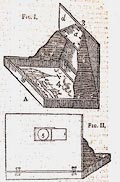







[ma]chine. There is an aperture in the lid of the box as is represented at 5. Figure II. in which is fixed a convex lens, opposite to the center of the mirrour. The lens must be a sufficient diameter to be looked thro' with both eyes at once, and must have such a degree of convexity, as that there be just half the distance of its focus between it and the center of the mirrour, over-against which it is placed; therefore as the distance between the vertical plane d d, Fig. I. in which the lens is fixed, and the center of the mirrour a will be in proportion to the size of the mirrour, the degree of convexity of the lens must be determined by the size of the mirrour, or vice versa.
The distance of the print 4, from the mirrour will be determined by the size of the box, but in this no great exactness is necessary, that distance which is just sufficient to cause the mirrour to take in the whole print, and no more, is the best.
The picture being reflected from the mirrour appears greatly relieved, and in a vertical position to an eye placed at the lens. When the machine is to be laid by, the pictures are put into the box, the brackets, being unhasped, shut down upon them, folding one over the other, the mirrour falls flat to the inside of the box-lid, and is fastened there by a button, the lid then shuts down, and all are locked up together.
A concave mirrour shews perspectives, &c. to equal, if not greater advantage, by reflexion, if they are placed in the focus, without any other apparatus: but those that are large enough for this purpose are sold at a high price.
P.S. Any of the optical shops will furnish the glasses; if your friend knows not any, on receiving a letter by post, and an order on the carrier, care shall be taken to supply them.
Commentary
A closely related device is the polyterpic table invented by John Buchanan about 1817, in the collection of the Royal Scottish Museum, Chamber Street, Edinburgh, item H.KNJ6. This is described in:-
Wright, Elizabeth F: 1989: John H Buchanan's Newly Iinvented Polyterpic Table: Proceedings of the Society of Antiquaries of Scotland: vol.119: pp.371-376
The polyterpic table seems just to be a furniture version of the zograscope, which has just a lens and mirror on a stand, for viewing perspective views. Also see:-
: 1995: Light from the Dark Room: National Galleries of Scotland:: exhibition catalogue
Chaldecott, J A: 1953: Zograscope or Optical Diagonal Machine: Annals of Science: vol.9: pp.315-322
 Gents Mag 1749 p.535
Gents Mag 1749 p.535